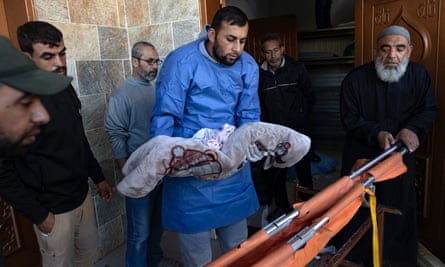The most senior diplomats from the US and the EU launched a dual diplomatic offensive in the Middle East on Saturday aimed at calming tensions that threaten chaos and wider conflict across the region.
Antony Blinken, the US secretary of state, began a five-day tour of the region with meetings in Turkey and the EU’s most senior diplomat Josep Borrell, visited the Lebanese capital Beirut.
The diplomatic effort came amid a new round of violence on the disputed frontier between Lebanon and Israel, which is seen by analysts as the most likely flashpoint for a new full-scale conflict.
Hezbollah fired multiple salvoes of rockets from southern Lebanon into Israel on Saturday as a “preliminary response” to the killing of a senior Hamas leader in Beirut last week in an attack widely attributed to Israel.
Borrell expressed alarm about the exchange of fire and said it was important that Lebanon was not dragged into the Gaza conflict.
“Diplomatic channels have to stay open. War is not the only option, it’s the worst option,” he said.
Most analysts believe an all-out conflict between Hezbollah and Israel is still unlikely, with neither prepared to risk the death, expense and destruction that such a clash would mean.
In two speeches in the past week, Hassan Nasrallah, the leader of the Islamist organisation, threatened retaliation for the killing of Saleh al-Arouri, the deputy political leader of Hamas, but did not commit to a major escalation of attacks on Israel.
Hamas and Hezbollah are allies, both close to Iran, and Arouri died in a neighbourhood that is a Hezbollah stronghold. Other Hamas leaders are based in Gaza, Qatar and Turkey.
Fighting also continued inside Gaza as the conflict between Hamas and Israel moved towards its fourth month, especially in and near the southern city of Khan Younis.
Blinken met Turkey’s president, Recep Tayyip Erdoğan, in Istanbul and is due to visit Israel, the occupied West Bank, Jordan, Qatar, the United Arab Emirates, Saudi Arabia and Egypt.
The US has offered staunch support to Israel since the outbreak of its war with Hamas three months ago. However, Blinken is expected to put pressure on the Israeli prime minister, Benjamin Netanyahu, to do more to protect civilians in Gaza, allow more aid into the territory and rein in outspoken far-right ministers who have called for the mass resettlement of Palestinians – rhetoric the US has condemned as inflammatory and irresponsible.
Netanyahu has angered Washington by so far refusing to engage in any detailed planning for the governance of Gaza when Israel’s military offensive ends, and by rejecting the US’s preferred options.
In recent days, senior Israeli officials have rushed to offer some postwar proposals.
On Thursday, the Israeli defence minister suggested Israel would keep control of Gaza’s security but with an undefined, Israeli-guided, Palestinian body running the day-to-day administration, and the US, the EU and regional partners taking responsibility for the reconstruction of the territory.
The plan, outlined by Yoav Gallant, differs starkly from US calls for a revitalised Palestinian Authority to take control of Gaza and for the start of fresh negotiations towards creating a Palestinian state alongside Israel.
Matthew Miller, the spokesperson for the US state department, said: “We don’t expect every conversation on this trip to be easy … There are obviously tough issues facing the region and difficult choices ahead.”
Gallant also indicated a more precise approach to targeting Hamas fighters and their leaders, in what appears to be another response to pressure from Washington.
Israel’s campaign in Gaza has killed more than 22,400 people, more than two-thirds of them women and children, according to the Hamas-run health ministry in the territory, with thousands more thought to be buried under rubble and tens of thousands wounded.
At least 122 Palestinians have been killed and 256 others injured in Gaza in the past 24 hours, the ministry said on Saturday. The UN and aid agencies say the territory is facing an acute humanitarian crisis.

The offensive was launched after Hamas sent thousands of militants into southern Israel on 7 October, killing about 1,200 people, mostly civilians, and abducting about 240 others.
Some of the Israeli forces that have recently been withdrawn from Gaza, partly in response to US pressure, are being redeployed to the north to deter Hezbollah.
There were no immediate reports of casualties or damage from the rockets fired by Hezbollah on Saturday, though the group said it had hit a key Israeli observation post with 62 rockets.
Israel’s military said it had responded to Saturday’s attacks with a drone strike on “a terrorist cell”.
Blinken’s talks with Turkey were expected to cover postwar scenarios for Gaza.
Washington wants regional countries, including Turkey, to play a role in reconstruction, governance and potentially security in Gaza, which has been run by Hamas since 2007, an official said.
More than two-thirds of Gaza’s 2.3 million population is displaced. Huge numbers of homes, schools, health facilities, roads and other basic necessities have been destroyed during the Israeli offensive.
In a video message posted late on Friday on Hamas’s social media channels, Ismail Haniyeh, the extremist organisation’s leader, urged regional leaders to tell Blinken that stability in the Middle East was “closely linked to our Palestinian cause”.
A further concern for Washington is intensifying attacks on commercial shipping in the Red Sea by Yemen’s Iran-backed Houthi rebels. Since 19 December, Houthis have carried out at least two dozen attacks in response to the conflict in Gaza, which have further heightened tensions, disrupted international trade and raised risks for the global economy.
Blinken will end his Saturday in Jordan, then travel to Qatar, the UAE and Saudi Arabia on Sunday and Monday, before visiting Israel and the West Bank on Tuesday and Wednesday. He will end the trip in Egypt.


I truly enjoy reading posts that provoke thought in both men and women. I also appreciate you letting me add a comment!